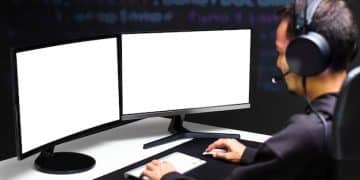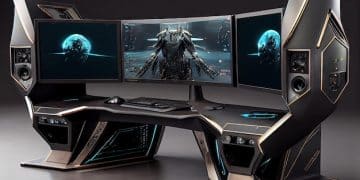PC Gaming Troubleshooting: Your Guide to Fixing Issues & Optimizing Performance
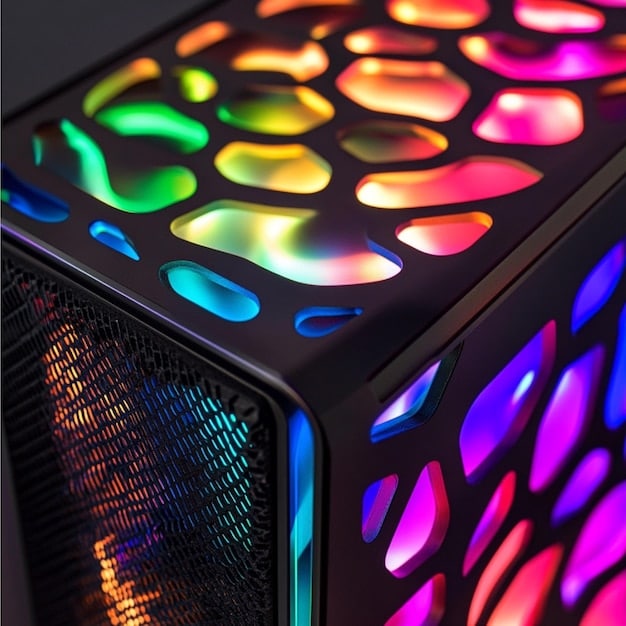
Struggling with PC gaming issues? This guide offers comprehensive troubleshooting tips and optimization strategies to fix common problems and enhance your gaming experience, ensuring peak performance and smooth gameplay.
Is your PC gaming experience plagued by frustrating issues like lag, crashes, or subpar graphics? Don’t let technical glitches ruin your gameplay! This comprehensive guide provides you with the essential PC Gaming Troubleshooting: Fixing Common Issues and Optimizing Your System for Peak Performance knowledge and techniques to diagnose and resolve problems, ensuring a smooth and immersive gaming experience.
Identifying and Addressing Common PC Gaming Issues
PC gaming, while offering unparalleled customization and performance, can sometimes be a minefield of technical issues. From stuttering frame rates to unexpected crashes, identifying the root cause is the first step towards a smooth gaming experience.
Let’s delve into some of the most common problems PC gamers face and how to tackle them head-on.
Frame Rate Issues
Low or inconsistent frame rates are a frequent complaint among PC gamers. This can be caused by a variety of factors, including inadequate hardware, outdated drivers, or overly demanding game settings.
Game Crashing
Random game crashes can be incredibly frustrating, especially when they occur during crucial moments. These crashes can stem from software conflicts, driver issues, or even hardware failures.
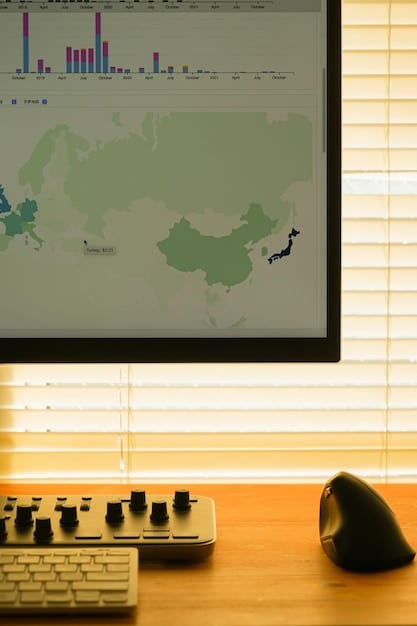
Driver Problems
Outdated or corrupted drivers are a major source of PC gaming problems. Ensuring that your graphics card, sound card, and network adapter drivers are up to date is crucial for optimal performance.
- Update your drivers regularly: Use the manufacturer’s software or Windows Update to keep your drivers current.
- Reinstall drivers: A clean reinstall can fix corrupted driver files.
- Roll back drivers: If a new driver causes issues, revert to a previous version.
By understanding these common issues and their potential causes, you can begin to diagnose and address the specific problems affecting your PC gaming experience. Remember, patience and a systematic approach are key to successful PC Gaming Troubleshooting: Fixing Common Issues and Optimizing Your System for Peak Performance.
Essential Hardware Checks for Optimal Gaming
Your PC’s hardware forms the foundation of your gaming experience. Ensuring each component is functioning correctly and meeting the demands of modern games is crucial for avoiding performance bottlenecks and stability issues.
Let’s explore essential hardware checks that can significantly improve your PC gaming experience.
CPU and GPU Temperature Monitoring
Overheating is a common culprit behind performance throttling and system instability. Monitoring your CPU and GPU temperatures is essential for ensuring they are operating within safe limits.
RAM Capacity and Speed
Insufficient RAM can lead to stuttering, long loading times, and even game crashes. Make sure you have enough RAM to meet the game’s requirements, and that your RAM’s speed is adequate for your CPU and motherboard.
Storage Performance
The type of storage you use can significantly impact loading times and overall system responsiveness. Solid-state drives (SSDs) offer dramatically faster performance compared to traditional hard disk drives (HDDs).
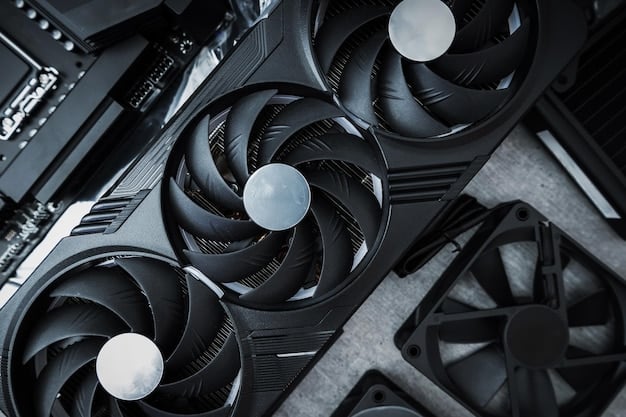
Performing these essential hardware checks can help you identify potential bottlenecks and ensure that your system is capable of delivering the gaming experience you desire. Consider upgrading components that are limiting your PC Gaming Troubleshooting: Fixing Common Issues and Optimizing Your System for Peak Performance.
Software Optimization Techniques for Enhanced Performance
Beyond hardware considerations, software optimization plays a vital role in maximizing gaming performance. Tweaking your operating system, game settings, and background processes can yield noticeable improvements.
Let’s explore some software optimization techniques that can boost your PC’s gaming capabilities.
Operating System Tweaks
Optimizing your operating system can free up resources and improve overall system performance. This includes disabling unnecessary services, managing startup programs, and adjusting visual effects.
Game Settings Optimization
Adjusting in-game graphics settings can have a significant impact on frame rates and visual fidelity. Experimenting with different settings to find a balance between performance and aesthetics is crucial.
- Lower resolution: Reduces the number of pixels the GPU needs to render.
- Adjust texture quality: Reduces memory usage and improves frame rates.
- Disable anti-aliasing: Reduces jagged edges but can improve performance.
Background Process Management
Unnecessary background processes can consume valuable resources and interfere with gaming performance. Closing unnecessary applications and disabling resource-intensive services can free up system resources.
By implementing these software optimization techniques, you can fine-tune your system for optimal gaming performance and minimize potential bottlenecks. Remember to back up your system before making any significant changes, as a part of comprehensive PC Gaming Troubleshooting: Fixing Common Issues and Optimizing Your System for Peak Performance.
Troubleshooting Common Game-Specific Issues
Many PC gaming issues are specific to individual games. Researching known issues and potential fixes for the games you play is an essential part of the troubleshooting process.
Let’s explore some common game-specific troubleshooting tips.
Compatibility Issues
Some games may have compatibility issues with certain hardware configurations or operating systems. Checking the game’s system requirements and researching known compatibility problems can help identify potential conflicts.
Configuration File Tweaks
Some games allow you to tweak configuration files to customize graphics settings, performance parameters, and other options. Modifying these files can sometimes improve performance or resolve specific issues.
Mod Conflicts
If you use mods, conflicts between them can cause crashes, performance problems, or other unexpected issues. Disabling mods one by one to identify the source of the conflict is a common troubleshooting technique.
Addressing game-specific issues often requires a combination of research, experimentation, and community support. Don’t hesitate to consult online forums, guides, and other resources for PC Gaming Troubleshooting: Fixing Common Issues and Optimizing Your System for Peak Performance.
Maintaining Your PC for Long-Term Gaming Performance
Regular maintenance is crucial for ensuring your PC continues to deliver optimal gaming performance over the long term. This includes cleaning your hardware, updating your software, and managing your storage.
Let’s explore some essential PC maintenance practices for maximizing long-term gaming performance.
Hardware Cleaning
Dust accumulation can cause overheating and performance throttling. Regularly cleaning your PC’s components, especially the CPU cooler and graphics card, can help maintain optimal temperatures.
Software Updates
Keeping your operating system, drivers, and games up to date is crucial for security, stability, and performance. Updates often include bug fixes, performance improvements, and new features.
- Schedule regular updates: Set reminders to check for updates regularly.
- Read release notes: Understand what’s changing in each update.
- Back up your system: Before major updates, create a system backup.
Storage Management
Keeping your storage organized and free of unnecessary files can improve system responsiveness and loading times. Defragmenting your hard drive (if you’re not using an SSD) and uninstalling unused programs can help optimize storage performance.
Implementing these maintenance practices can help you extend the lifespan of your PC and ensure that it continues to deliver a smooth and enjoyable gaming experience for years to come. Remember that consistent maintenance is a vital component of successful PC Gaming Troubleshooting: Fixing Common Issues and Optimizing Your System for Peak Performance.
Advanced Troubleshooting Techniques for Persistent Issues
When basic troubleshooting steps fail to resolve persistent PC gaming issues, more advanced techniques may be required. This could involve examining system logs, using specialized diagnostic tools, or seeking expert assistance.
Let’s explore some advanced troubleshooting techniques for tackling stubborn PC gaming problems.
System Log Analysis
System logs can provide valuable clues about the cause of crashes, errors, and performance problems. Analyzing these logs can help identify specific software conflicts, driver issues, or hardware failures.
Diagnostic Tools
Various diagnostic tools can help identify hardware problems, test system stability, and monitor performance metrics. These tools can provide insights into potential bottlenecks and hardware failures.
Seeking Expert Assistance
If you’re unable to resolve a persistent PC gaming issue on your own, seeking assistance from a qualified technician or online support community may be necessary. Experts can provide specialized knowledge and guidance to diagnose and fix complex problems.
When faced with particularly challenging issues, don’t hesitate to leverage advanced troubleshooting techniques and seek expert assistance. The key to successful PC Gaming Troubleshooting: Fixing Common Issues and Optimizing Your System for Peak Performance is persistence and a willingness to explore all possible solutions.
| Key Point | Brief Description |
|---|---|
| 🛠️ Update Drivers | Keep graphics, audio, and network drivers current for stability. |
| 🌡️ Monitor Temps | Ensure CPU and GPU temperatures are within safe limits to avoid throttling. |
| ⚙️ Optimize Settings | Adjust in-game graphics and OS settings for best performance. |
| 🧹 Regular Maint. | Clean hardware and manage storage to maintain long-term performance. |
Frequently Asked Questions
▼
Ideally, update your graphics drivers whenever a new release is available, especially before playing a new game. This ensures you have the latest performance improvements and bug fixes.
▼
For CPUs, aim for below 80°C, and for GPUs, below 85°C. Exceeding these temperatures for extended periods can impact performance and potentially damage your hardware.
▼
Yes, disabling unnecessary background processes can free up valuable system resources, leading to smoother gameplay. Close any applications you’re not actively using before launching your game.
▼
VSync synchronizes your game’s frame rate with your monitor’s refresh rate to prevent screen tearing. FreeSync (AMD) and G-Sync (NVIDIA) are adaptive sync technologies that dynamically adjust the refresh rate.
▼
Use monitoring tools like MSI Afterburner, HWMonitor, or the Windows Performance Monitor to track CPU and GPU usage, temperature, frame rates, and other key performance metrics.
Conclusion
By mastering these PC Gaming Troubleshooting: Fixing Common Issues and Optimizing Your System for Peak Performance techniques, you can conquer frustrating technical challenges and unlock the full potential of your gaming rig, ensuring countless hours of immersive and enjoyable gameplay.
